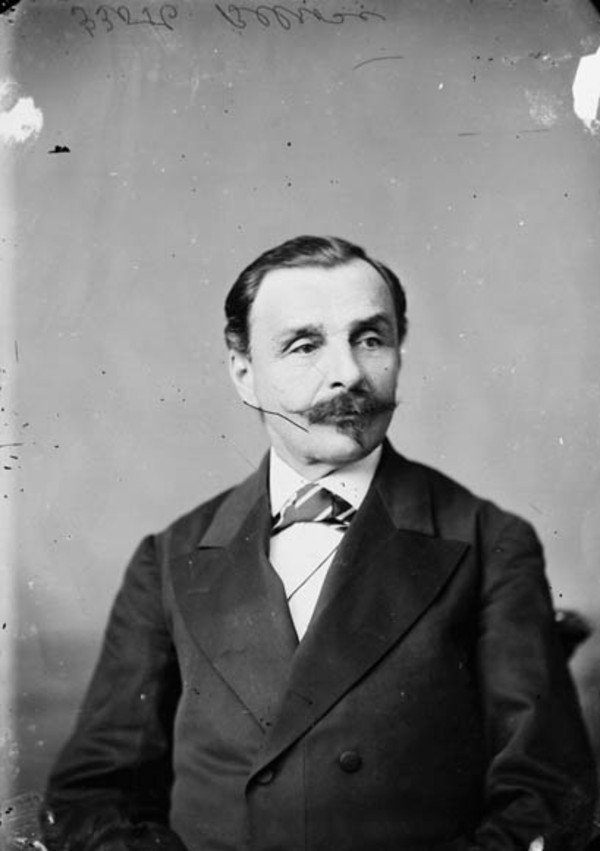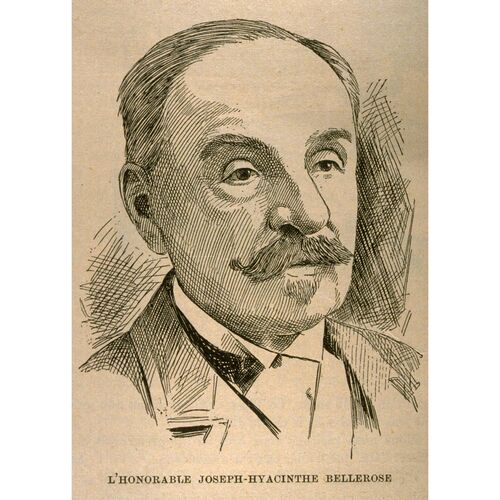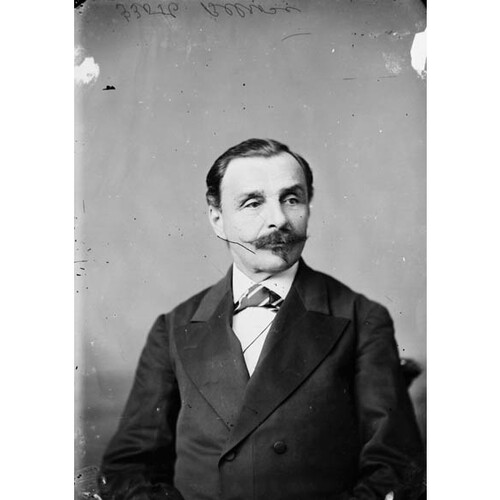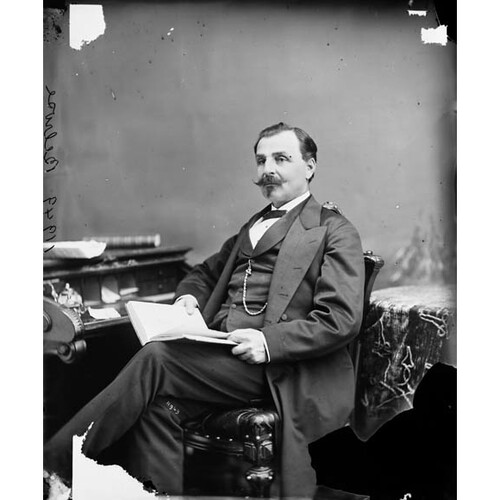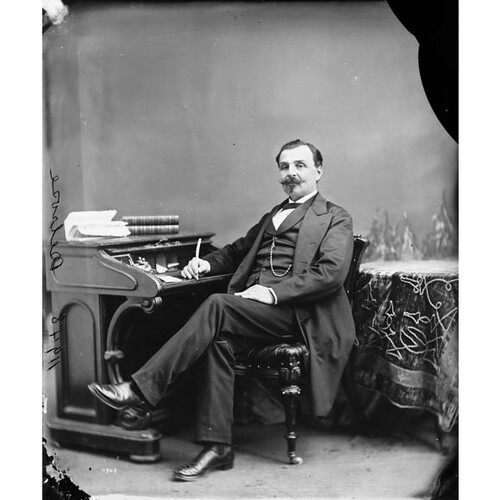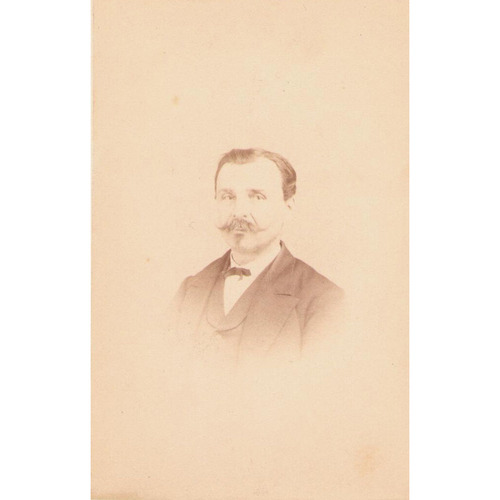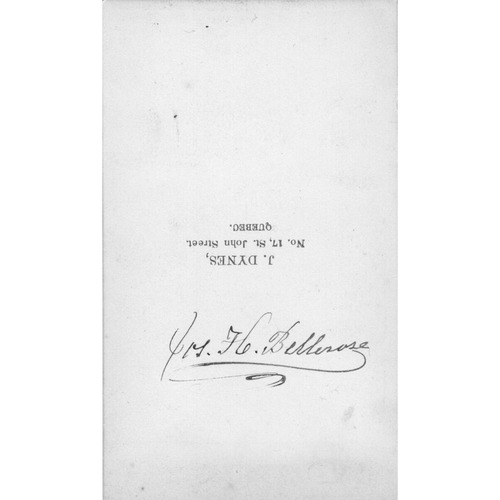BELLEROSE, JOSEPH-HYACINTHE (baptized Joseph), merchant, militia officer, politician, and jp; b. 12 July 1820 in Trois-Rivières, Lower Canada, son of Michel-Hyacinthe Bellerose, a merchant, and Geneviève-Sophie Lemaître, dit Lottinville; d. 13 Aug. 1899 in Saint-Vincent-de-Paul (Laval), Que.
Having received his early schooling in Trois-Rivières, Joseph-Hyacinthe Bellerose attended the Séminaire de Nicolet from 1833 and the Séminaire de Saint-Hyacinthe from 1836 or 1837. After finishing his classical education in 1842, he began studying law in Montreal. There, while still a student, he married Henriette Armand on 4 Oct. 1847. She was the widow of merchant Michel Brunet of Saint-Vincent-de-Paul and the daughter of François Armand, dit Flamme, a lieutenant-colonel in the militia who had been a major shareholder in the Banque du Peuple [see Louis-Michel Viger*]; her brother, Joseph-François Armand, would become a legislative councillor and senator. The couple made their permanent home at Saint-Vincent-de-Paul, where Bellerose took up business and farming.
Bellerose played an important role in the militia and raised some 20 volunteer regiments. Rising quickly through the ranks, he was commissioned ensign in the 2nd Battalion of Terrebonne militia on 6 Dec. 1855 and he became its adjutant. On 29 Jan. 1857 he was appointed captain of the newly created 1st Company of Saint-Vincent-de-Paul volunteer militia, and on 4 December he was made a brigade major. In 1858 Bellerose was approached about a captaincy in the 100th Foot of the regular army, then being mustered for imperial service, but he declined the governor general’s offer at the last minute for reasons unknown. He became brigade major of Military District No.8 on 22 May 1861 and commanding officer of the new 12th Battalion of Volunteer Militia on 29 Oct. 1862.
After running unsuccessfully in the 1861 election against Louis-Siméon Morin* in Laval, Bellerose was elected to the Legislative Assembly of the Province of Canada for this riding in 1863 by a majority of 94. In 1867, in the first general election after confederation, he ran there again as the Conservative candidate both federally and provincially and was elected to both houses unopposed. He was returned by acclamation for Laval to the Quebec Legislative Assembly in 1871 and to the House of Commons the following year. On 16 Oct. 1873 he was named to the Senate, where he represented the division of Lanaudière until his death; although he gave up his seat in the commons, he kept his place in the Quebec assembly until the 1875 provincial election. It was at his insistence that from 1877 the record of the Senate’s debates was translated into French. He also served as chairman of the Senate committee on private bills.
Both in politics and in his outlook on society, Bellerose showed himself to be a conservative with ultramontane leanings. Thus he criticized the bill introduced by Conservative premier Pierre-Joseph-Olivier Chauveau* in 1869 to divide the Council of Public Instruction into two committees, one Catholic and the other Protestant; however, like Joseph-Édouard Cauchon* and Joseph-Adolphe Chapleau, he supported his party in the vote. Again, when the apostolic delegate Dom Joseph-Gauthier-Henri Smeulders visited the province in 1883 and 1884, Bellerose followed the example of his ultramontane colleagues in presenting him with a series of requests for a canonical inquiry into the many religious problems in the province [see Louis-François Laflèche; Elzéar-Alexandre Taschereau].
Bellerose was a close friend of Senator François-Xavier-Anselme Trudel* and one of the main financial supporters and defenders of the Montreal ultramontane newspaper L’Étendard, founded by Trudel in 1883, which sharply criticized the Conservative government of the province. With the ultramontanists – the Castors as they were called – he campaigned against Conservative premier Joseph-Alfred Mousseau* and even allied himself with Honoré Mercier’s Liberals during the by-elections of June 1883 and July 1884 in his stronghold of Laval, where an attempt was made to defeat the government candidate Pierre-Évariste Leblanc*. In 1885 he again made common cause with the Liberals in denouncing the federal Conservative government for permitting the execution of Louis Riel*, and he helped Mercier’s Parti National to win the provincial election in October 1886. These alliances fell apart in 1892 when, faced with the accusations of scandal that were being heaped upon the Mercier government, Bellerose decided to support the Conservatives under ultramontanist Charles-Eugène Boucher* de Boucherville. During the Manitoba schools dispute in 1895 he actively encouraged the French Canadian ministers in Mackenzie Bowell*’s federal cabinet to resign and urged his fellow senators not to accept any portfolio until Roman Catholic schools were re-established.
In the course of his career, Bellerose served in various other capacities, such as justice of the peace; commissioner for the erection of parishes and for the building and repair of churches, presbyteries, and cemeteries; mayor of the municipality of Saint-Vincent-de-Paul parish from 1867 to 1887; vice-president of the Sovereign Fire Insurance Company; and president of the Union Navigation Company, controlled by Sir Hugh Allan*.
Joseph-Hyacinthe Bellerose died of stomach cancer on 13 Aug. 1899 and was buried on the 16th in the church vault at Saint-Vincent-de-Paul. A widower, he left, according to La Patrie, “a fortune of $30,000, of which $25,000 was to be divided equally between the Collège Laval and the convent of the Sisters of Providence at Saint-Vincent-de-Paul for the relief of the poor.”
ANQ-M, CE1-51, 4 oct. 1847; CE1-59, 16 août 1899. ANQ-MBF, CE1-48, 12 juill. 1820. NA, RG 68, General index, 1841–67. La Patrie, 14 août 1899. Auguste Achintre, Manuel électoral; portraits et dossiers parlementaires du premier Parlement de Québec (Montréal, 1871; réimpr. 1871), 35. Audet, “Les législateurs du Bas-Canada.” Canadian directory of parl. (Johnson). J. Desjardins, Guide parl. RPQ. C.-P. Choquette, Histoire du séminaire de Saint Hyacinthe depuis sa fondation jusqu’à nos jours (2v., Montréal, 1911–12), 2: 246. J.-A.-I. Douville, Histoire du collège-séminaire de Nicolet, 1803–1903, avec les listes complètes des directeurs, professeurs et élèves de l’institution (2v., Montréal, 1903), 2: 253. Rumilly, Hist. de la prov. de Québec, vols.1–7. “Le sénateur Luc-Hyacinthe Bellerose,” BRH, 39 (1933): 28–29.
Cite This Article
Marcel Caya, “BELLEROSE, JOSEPH-HYACINTHE (baptized Joseph),” in Dictionary of Canadian Biography, vol. 12, University of Toronto/Université Laval, 2003–, accessed January 1, 2026, https://www.biographi.ca/en/bio/bellerose_joseph_hyacinthe_12E.html.
The citation above shows the format for footnotes and endnotes according to the Chicago manual of style (16th edition). Information to be used in other citation formats:
| Permalink: | https://www.biographi.ca/en/bio/bellerose_joseph_hyacinthe_12E.html |
| Author of Article: | Marcel Caya |
| Title of Article: | BELLEROSE, JOSEPH-HYACINTHE (baptized Joseph) |
| Publication Name: | Dictionary of Canadian Biography, vol. 12 |
| Publisher: | University of Toronto/Université Laval |
| Year of publication: | 1990 |
| Year of revision: | 1990 |
| Access Date: | January 1, 2026 |


